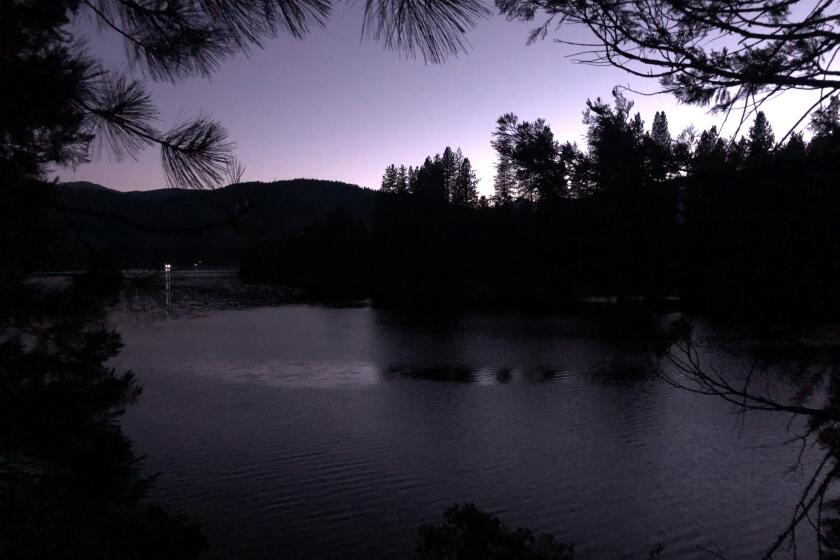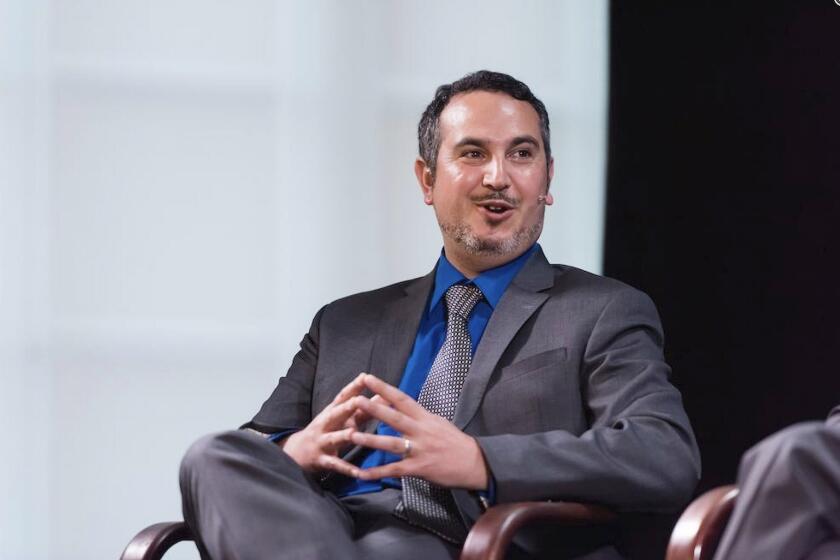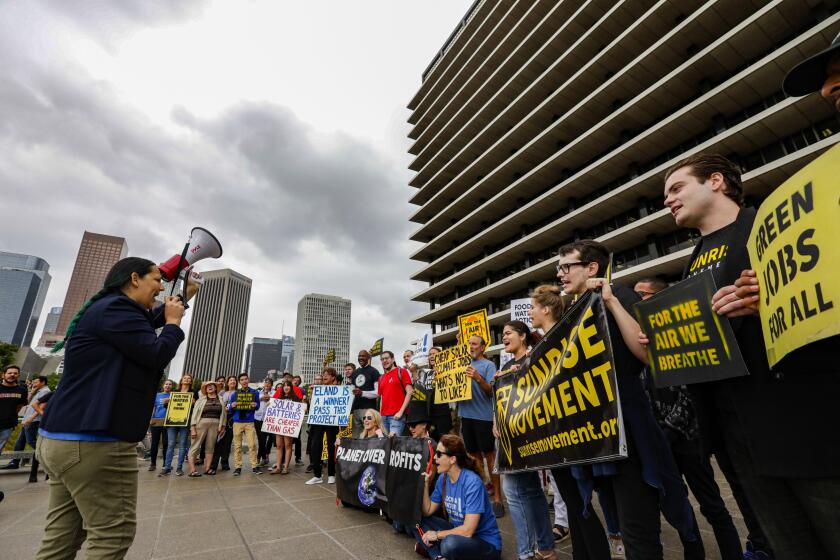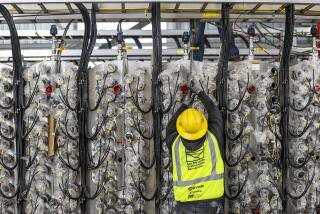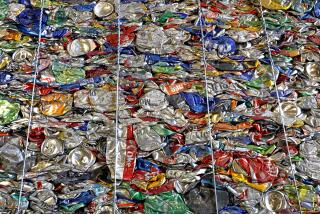Amid water restrictions, L.A. residents can get free recycled water for lawns
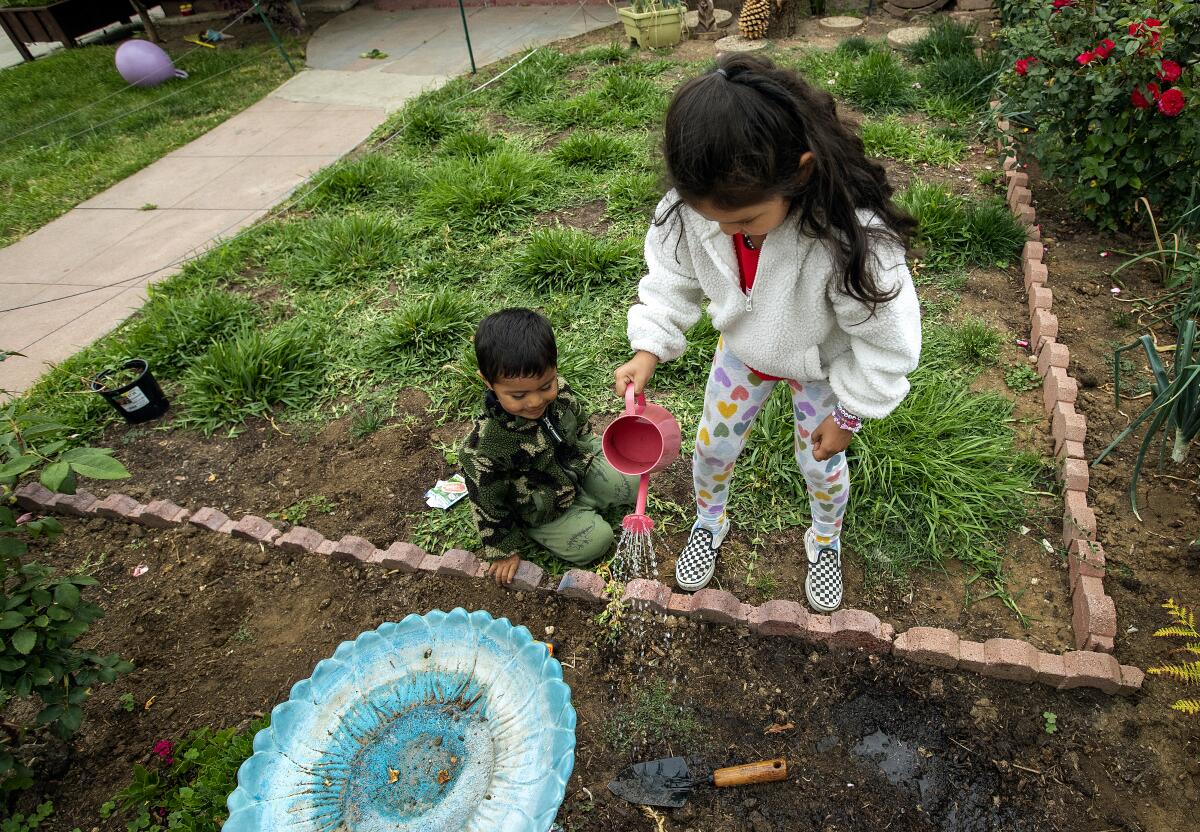
- Share via
Angelenos can stock up again on gallons of recycled water to irrigate their trees, plants and lawns — and free of charge through a Los Angeles Department of Water and Power program.
Mayor Eric Garcetti announced the reopening of two recycled water fill stations Thursday at the Los Angeles-Glendale Water Reclamation Plant and the L.A. Zoo parking lot.
The city’s Residential Recycled Water Fill Station Program will offer up to 300 gallons of disinfected water per person per visit, the agency said. Participants can bring their own containers with water-tight lids to a water fill station. To qualify for the program, they must be an active customer with the Department of Water and Power, complete an application form and take training classes available at the sites.
“As we approach the hottest days of the year, we need to help Angelenos build on recent reductions to conserve even more — and that means providing real solutions, alternatives, and incentives to cut back on their water use,” Garcetti said in a statement.
Wildfires. Heat. Drought. Possible power shortages. The next month could be a tough one.
Recycled water will be available at the L.A.-Glendale Water Reclamation Plant every Thursday, Friday and Saturday between 8 a.m. and 3 p.m. Water can be filled at the zoo every Monday from 8 a.m. to 2 p.m.
“Recycled water is the definition of conservation,” said Councilmember Mitch O’Farrell, chair of the City Council’s Energy, Climate Change, Environmental Justice and L.A. River committee and whose 13th district comprises the L.A.-Glendale Water Reclamation Plant. “By offsetting demand for precious drinking water, this program will make recycled water more accessible for everyday Angelenos.”
The program first began in 2016 during the state’s ongoing battle with drought and was reinstated in 2017 and again in 2018, according to Jesus Gonzalez, manager of recycled water policy in LADWP’s Water Resources Group.
“We’re intending to keep this program on as long as we need to,” he said. “Through the summer and fall, it’ll be open. If we get a wet water year, then we’ll have to re-assess if it needs to remain but our intention is to keep it on as long as necessary.”
The agency is looking to expand the water recycling program and is working with the state for approval on additional fill stations through the city, specifically in the Valley and South L.A., Gonzalez said.
As California enters its third year of drought, grappling with a depleted water supply and the driest water year in a century, the DWP reduced its three-day-a-week water rules, in place for customers since 2009, to two days a week beginning in June. The restrictions apply to customers in the DWP’s coverage area.
Under the restrictions, residents were assigned two water days a week based on addresses. Those with odd addresses were assigned Monday and Friday while even addresses got Thursday and Sunday. Watering is limited eight minutes or 15 minutes for sprinklers with water-conserving nozzles. Watering isn’t permitted between 9 a.m. and 4 p.m. regardless of the day.
A state water board official has resigned, claiming the Newsom administration has “nearly eviscerated” the board’s ability to confront drought.
Violators of the restrictions will get a warning followed by fines for each subsequent violation, according to the agency.
The water cutbacks led to the lowest water use on record for June in the city’s history, Garcetti said. DWP customers used 9% less water in June 2022 than they did in June 2021, according to preliminary data.
Now, customers will be able to use the recycled water stations on restricted days.
The program reflects a broader dedication to water conservation in the city. Years ago, Garcetti vowed to recycle all of the city’s wastewater by 2035.
The city and other agencies across Southern California are considering “direct potable use,” and putting purified recycled water back into drinking water systems.
The L.A.-Glendale Water Reclamation Plant has been producing recycled water for the past four decades for use by city parks, city departments and other private customers, including golf courses, Gonzalez said.
Officials are currently looking into ways of taking excess wastewater from the plant and treating it to higher qualify standards for potable re-use, Gonzalez said, adding that the state is expected to unveil regulations for potable use at the end of 2023.
“That will allow water purveyors and agencies to be able to implement technology to able to treat wastewater and to allow it to be part of its drinking water supply,” he said.
The DWP has to modernize its rates to match the rapidly changing electricity market and facilitate the transition to cleaner, greener energy.
More to Read
Sign up for Essential California
The most important California stories and recommendations in your inbox every morning.
You may occasionally receive promotional content from the Los Angeles Times.
